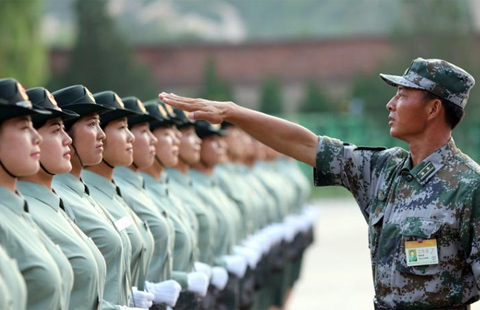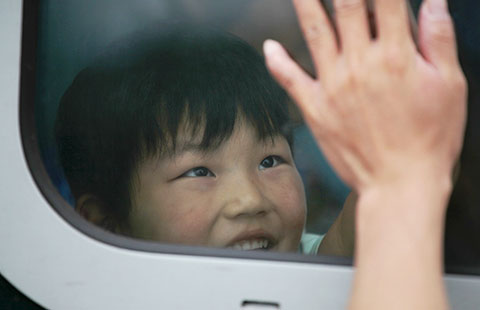Warner forms China tie-up
Updated: 2015-08-27 08:02
By Amyhe in New York(China Daily)
|
|||||||||
 |
|
Pedestrians walk past a Warner Brothers studio in Shanghai. The US company is in talks to partner with China Media Capital to develop Chineselanguage films. [Photo provided to China Daily] |
Joint venture with CMC will develop local language movies
Warner Brothers, the studio behind Gravity and Interstellar, is in talks to partner with China Media Capital to develop Chinese-language films for China, where a rapidly growing box office continues to lure Hollywood studios.
The joint venture would be Warner Bros' second venture in China, after partnering with China Film Group to produce and distribute movies.
"We confirm that CMC is now in talks with WB to create a JV. The talks have been going well, but we cannot disclose more details at this stage," a spokesperson for CMC confirmed to Variety magazine on Tuesday. Sources at Warner Bros in Los Angeles also confirmed the partnership discussions, Variety said.
Phil Contrino, vice-president and chief analyst of BoxOffice.com, said that filmmakers are trying to respond to demand from local audiences for homegrown movies, as shown by the latest Chinese box office hit Monster Hunt, which has earned $375 million in China since its July release. The fantasy adventure has become the second-highest grossing film at the Chinese box office, outranked only by Furious 7, the seventh in the fast and furious Hollywood franchise.
"Chinese filmmakers in general are still tapping into what the public there wants from their homegrown products, and we're still getting to a point where homegrown movies are starting to really perform close to what Hollywood movies are doing. That's crucial. Everybody's still kind of learning, and figuring it out," Contrino said.
There have been increasing partnerships between Hollywood and China, with many studios in the United States collaborating with Chinese companies in the hope that it will lead to film releases in China, which allows only 34 foreign films released a year.
Stan Rosen, a Chinese film expert and professor at the University of Southern California US-China Institute, said the combination of the foreign film quota and so-called blackout dates - periods during the year when only Chinese films are allowed to be released, typically around holidays like the Lunar New Year and the summer - mean that Warner Bros' plan to make Chinese-language films is a "better strategy" for the long term.
"The China market is on track to surpass last year's market by August this year and it's going to be the biggest market in the world by about 2018-19, so it makes sense to make Chinese films for the China market. You can't lose," he said.
With the number of movie screens in China increasing almost five-fold between 2010 and 2015 - from 5,000 to around 24,000 - making more movies for the Chinese audience will benefit Warner, he said.
"China Media Capital has been very successful," he said. "Warner is partnering with good people. A lot of details are not yet known, but certainly given the entry in the China market and the increase in film screens, local movies are favored."
Last October, Warner Bros partnered with media company Shanghai Media Group, Chinese investment fund CMC Capital Partners and communications group WPP to create a fund that invests in Chinese and international film, television and live entertainment. It focuses on Chinese-language programming that is distributed in China and around the world, according to Warner Bros.
CMC, a State-backed entity, has another joint venture deal with DreamWorks Animation SKG called Oriental DreamWorks. Oriental and DreamWorks are currently working on Kung Fu Panda 3, the third installment in the popular animation franchise, due for release in January.
amyhe@chinadailyusa.com
- Turkey to hold snap parliamentary election
- Caroline Kennedy used personal email for official business
- Czech appeals for closing Schengen external border
- DPRK says inter-Korean contact gives lesson to South Korea
- Trial starts for Chinese scholar expelled from Norway
- Britain to crack down illegal working

 Female honor guards train for military parade debut
Female honor guards train for military parade debut
 Floral replica of the Great Wall appears on Tian'anmen Square
Floral replica of the Great Wall appears on Tian'anmen Square
 Chinese long jumpers leap to history
Chinese long jumpers leap to history
 Goodbyes and tears as left-behind children head home
Goodbyes and tears as left-behind children head home
 Top 10 richest universities in China
Top 10 richest universities in China
 Chinese long jumpers leap to history
Chinese long jumpers leap to history
 Female honor guards train for military parade debut
Female honor guards train for military parade debut
 Top 10 richest universities in China
Top 10 richest universities in China
Most Viewed
Editor's Picks

|

|

|

|

|

|
Today's Top News
Two US TV journalists fatally shot on air
Smaller cub died at National Zoo
Central bank lowers lending rate to ease debts
Officials on suspended death sentence face life behind bars
US National Security Adviser Rice to visit Beijing this weekend
Warner Bros plans to develop Chinese-language movies
Central bank announces rate cut to bolster real economy
Investors in for long haul amid selloff
US Weekly

|

|







